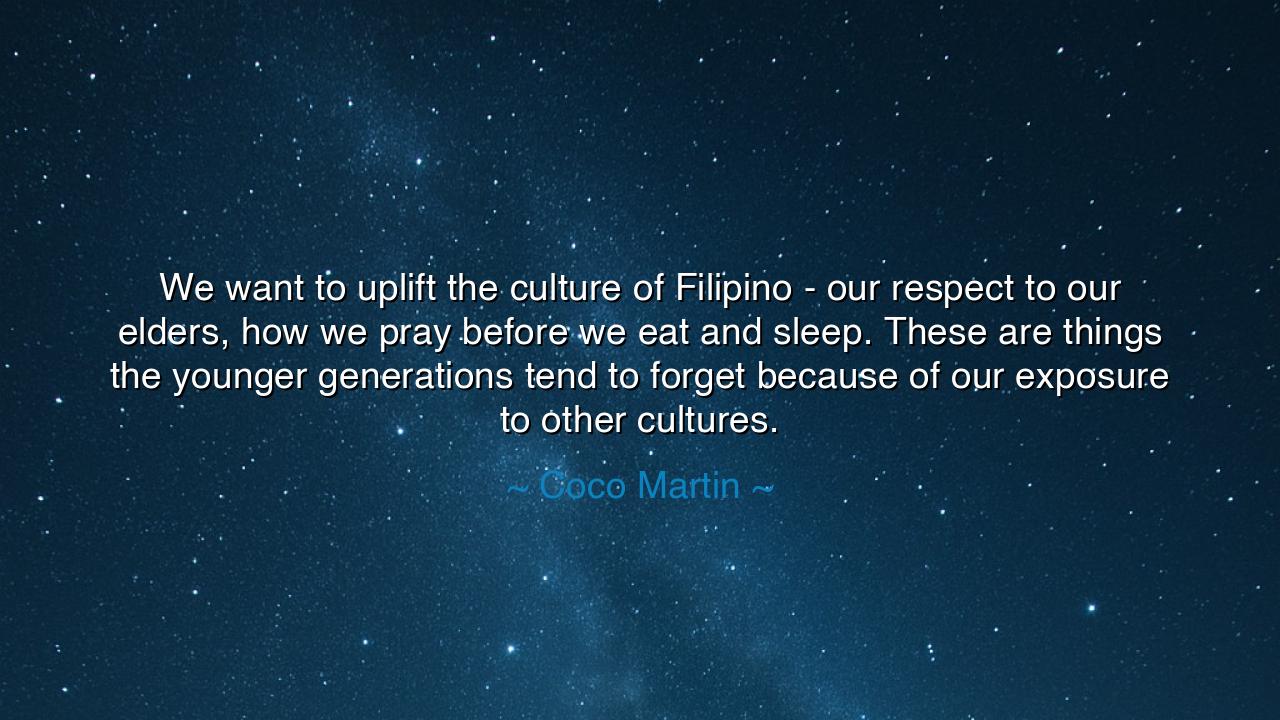
We want to uplift the culture of Filipino - our respect to our
We want to uplift the culture of Filipino - our respect to our elders, how we pray before we eat and sleep. These are things the younger generations tend to forget because of our exposure to other cultures.






The words of Coco Martin echo like a call from the ancestors — a reminder carved from the soul of the Filipino. “We want to uplift the culture of Filipino — our respect to our elders, how we pray before we eat and sleep. These are things the younger generations tend to forget because of our exposure to other cultures.” In this utterance lies both sorrow and strength, both warning and hope. It is a cry to awaken the Filipino spirit, a plea that we may not lose our essence in the flood of foreign winds that sweep across our islands.
Once, the Filipino heart was a lamp that never dimmed. In every home, a child would take the hand of an elder and press it to their forehead — “mano po”, a gesture of reverence not just to the person, but to the life and wisdom that came before them. Before every meal, hands would join, eyes would close, and prayers would rise like incense, thanking the unseen for the blessings of rice and fish, of kin and shelter. But now, in the rush of the modern world — where steel towers replace nipa huts, and glowing screens outshine the stars — these gestures fade like whispers lost in the wind.
To respect our elders is not a mere act of manners; it is the acknowledgment of lineage, of time itself. The elder is the bridge between what was and what shall be. In the days of old, when tribes gathered by the fire, it was the babaylan and the datu, the grandmother and the father, who held the stories that shaped the tribe’s soul. They taught that to bow before one older than you is not to diminish yourself, but to honor the roots that hold you steady in the storm.
History offers us countless lessons. Think of Apolinario Mabini, the Sublime Paralytic, who even when his body was frail, commanded the respect of heroes with his wisdom. His strength did not lie in the sword but in the reverence others had for his insight — a respect born of humility and discipline. Yet what would Mabini think, were he to see our times now? Would he not grieve to see a youth quick to speak but slow to listen, quick to consume but slow to pray?
Coco Martin’s words speak not against other cultures, but against forgetfulness. For to forget one’s roots is to drift without an anchor. Exposure to the world is a gift — but a gift that must be received with discernment. When the storm of modernity rages, the tree that stands tall is not the one that forgets its soil, but the one whose roots dig deeper still. To imitate blindly is to vanish; to adapt wisely is to live.
Let me tell you a story of Lola Rosa, a widow from Bicol. Her children went abroad, chasing gold and comfort. Years passed, and when they returned, they no longer spoke her dialect. They no longer said “po” or “opo.” They no longer bowed their heads in prayer before meals. Lola Rosa smiled still — but behind her eyes, there was the quiet ache of a soul unseen. One day, her grandson, curious and young, asked her to teach him the Ama Namin in Bikolano. And when she heard his voice stumble through the ancient words, she wept — for she saw that her blood remembered. And so, through that child, the chain of remembrance was restored.
The lesson is clear as dawn: to be Filipino is not only to be born under the same sun, but to carry the light of our forebears within us. We are the heirs of a faith that prays before it eats, of hearts that bend in reverence before their elders, of souls that find holiness in simplicity. Let us not let that light be swallowed by the shadow of forgetting.
And so, my children, I say — remember. When you see your parents, take their hand and bless it. When you sit to eat, bow your head in prayer. When the world tempts you to mock tradition, stand firm, and let your heart speak the ancient word: “I am Filipino.” In remembering, you do not merely honor the past — you sanctify the future.






AAdministratorAdministrator
Welcome, honored guests. Please leave a comment, we will respond soon